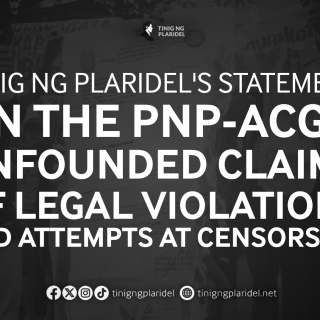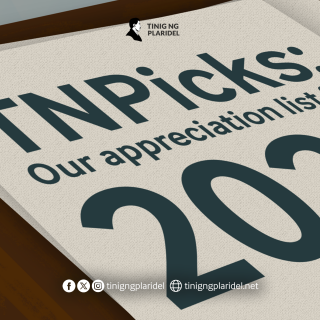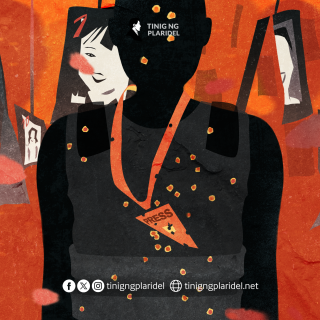New year. New name. New dean.
Two months after its renaming, the UP College of Media and Communication (CMC) is set to welcome another change on March 27. The Board of Regents (BOR)—the university’s highest decision-making body—will select a new dean for Maskom.
However, with the issues that currently hound the university and the nation, a new college administration is not a concern solely for the CMC community.
Polarization is tearing Filipinos apart with the feud between the Marcos and Duterte dynasties, who failed to deliver their promise of uniting the nation during the campaign season. Exacerbating this divide is the spread of disinformation, driven by organized online troll networks that have also undermined the public’s trust in journalists.
Media watchdogs tallied around 135 cases of attacks against journalists from July 2022 to April 2024 despite President Ferdinand Marcos Jr.’s promise to exert “double effort” in protecting media workers. Meanwhile, the College Editors Guild of the Philippines logged 206 incidents of campus press freedom violations from 2023 to 2024, showing that the Campus Journalism Act of 1991 falls short of shielding student publications from harassment.
While media workers remain steadfast in reporting the facts, the polluted information ecosystem enables candidates in the upcoming elections to distort the truth to serve their agendas.
We cannot rely on the state, which benefits from disinformation, to cure the poison that fuels false narratives. Journalists, the academe, and the public must take a stand and stop hoaxes from further deepening divisions among our people.
Hence, the next dean must recognize that her responsibilities extend far beyond the walls of Plaridel. We need someone who can transform the role of a dean beyond an administrator to a leader who can mobilize future media workers to protect the truth at all costs. She must be unwavering in protecting the community and calling a spade a spade, especially in the face of attacks from online trolls and the state.
Both candidates for the deanship hail from the Journalism Department: Professor Rachel Khan and Associate Professor Ma. Diosa Labiste, both of whom have served UP and the nation for several years.
If the selection is based solely on experience in journalism and the academe, the nominees undoubtedly are highly qualified for the position.Both candidates share a similar vision in sustaining Maskom’s programs for media literacy, ensuring the curriculum meets the needs of the rapidly changing media landscape and taking care of the college’s primary constituents.
But Maskom does not exist in a vacuum. The P2.08-billion budget cut to UP will further impede the college’s capability to provide better spaces for its student organizations and equipment for production classes.
One key qualification the university has set for deanship selection is the candidate’s ability to generate resources. While a dean must ensure that their constituents receive the resources they deserve, they must also firmly assert that it is the state’s responsibility to provide adequate support for UP.
The service of a dean must not be equated with their ability to generate income or sell out Maskom to corporate overlords. Service in UP, let alone in the country, is service for the people—and no amount will ever be enough for it.
Instead, the BOR must select someone who is attuned to the needs of not only those in UP but also those in the margins.
At Maskom, we share people’s stories and amplify their voices, especially those of the marginalized and victims of injustice. However, the CMC dean must understand that this responsibility goes beyond storytelling. The fight for our people continues alongside them—from the dean’s office to the streets—because leadership entails showing up in the face of struggle.
This, in turn, should make more students understand better the essence of protest and collective action and be inspired to do the same. Solving the disinformation problem, in particular, requires us to understand how people outside our bubble perceive the information they encounter online. Hence, the next dean’s vision must be centered on actively collaborating with communities beyond Maskom.
At the same time, the incoming dean should engage with their constituents, especially the student body, on equal footing.
While the candidates’ visions include matters new to the CMC community, the incoming dean must acknowledge the systems currently in place and allow these to thrive. These include student-led initiatives such as organization fairs, CMC week, consultations, and media safety training programs, among others.
Maskom students have long-standing calls reflected in UP CMC Student Council’s Maskom Agenda, which was signed by the candidates during the student-led forum for the dean selection. The next dean’s commitment to addressing these, such as the revision of the organization recognition guidelines and Tinig ng Plaridel’s funding, shall not be limited to signing the pledge.
In addressing the Maskom Agenda, constituents must feel heard and empowered to voice their demands without hesitation. The incoming dean should be a steadfast ally—someone who will fight for what the Maskom community rightfully deserves and refuse to settle for the bare minimum.
More importantly, we should also challenge the incoming CMC administration to come up with certain measures to ensure the community’s safety, besides guaranteeing the college as a haven for press freedom.
The fight to free young community journalist Frenchie Mae Cumpio, who remains unjustly detained on trumped-up charges, continues. Filmmakers grapple with censorship in local film festivals. Red-tagging remains rampant against media workers and some members of the Maskom community.
As CMC’s communicator, the dean must be uncompromising in their rhetoric when defending the college and media workers from threats and harassment.
The Philippine media industry endures to this day, overcoming dictatorships and crackdowns against the press through the solidarity of those behind the cameras and the audiences. That same solidarity must propel Maskom forward in an era where disinformation wreaks havoc on our nation.
Restoring Filipinos’ trust in our media institutions may not fall within a dean’s official duties, but we need a leader who will go beyond the role—one who will fortify Maskom’s ties with the masses it is meant to serve.









